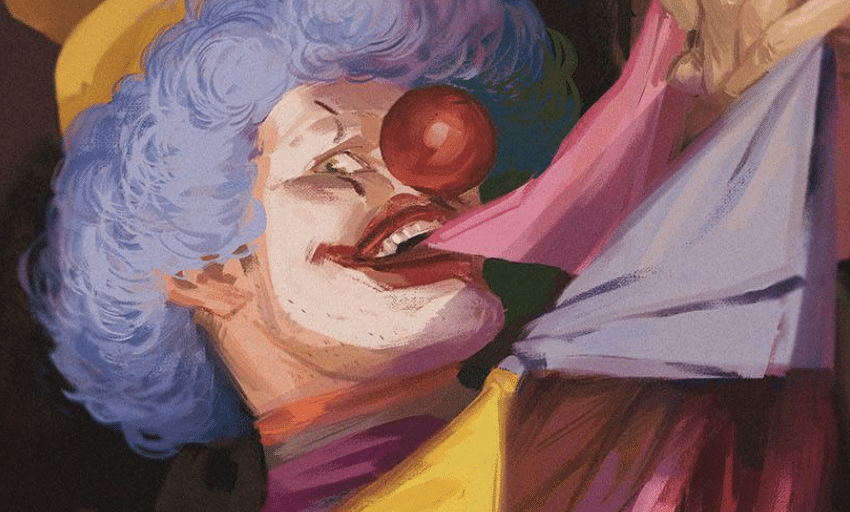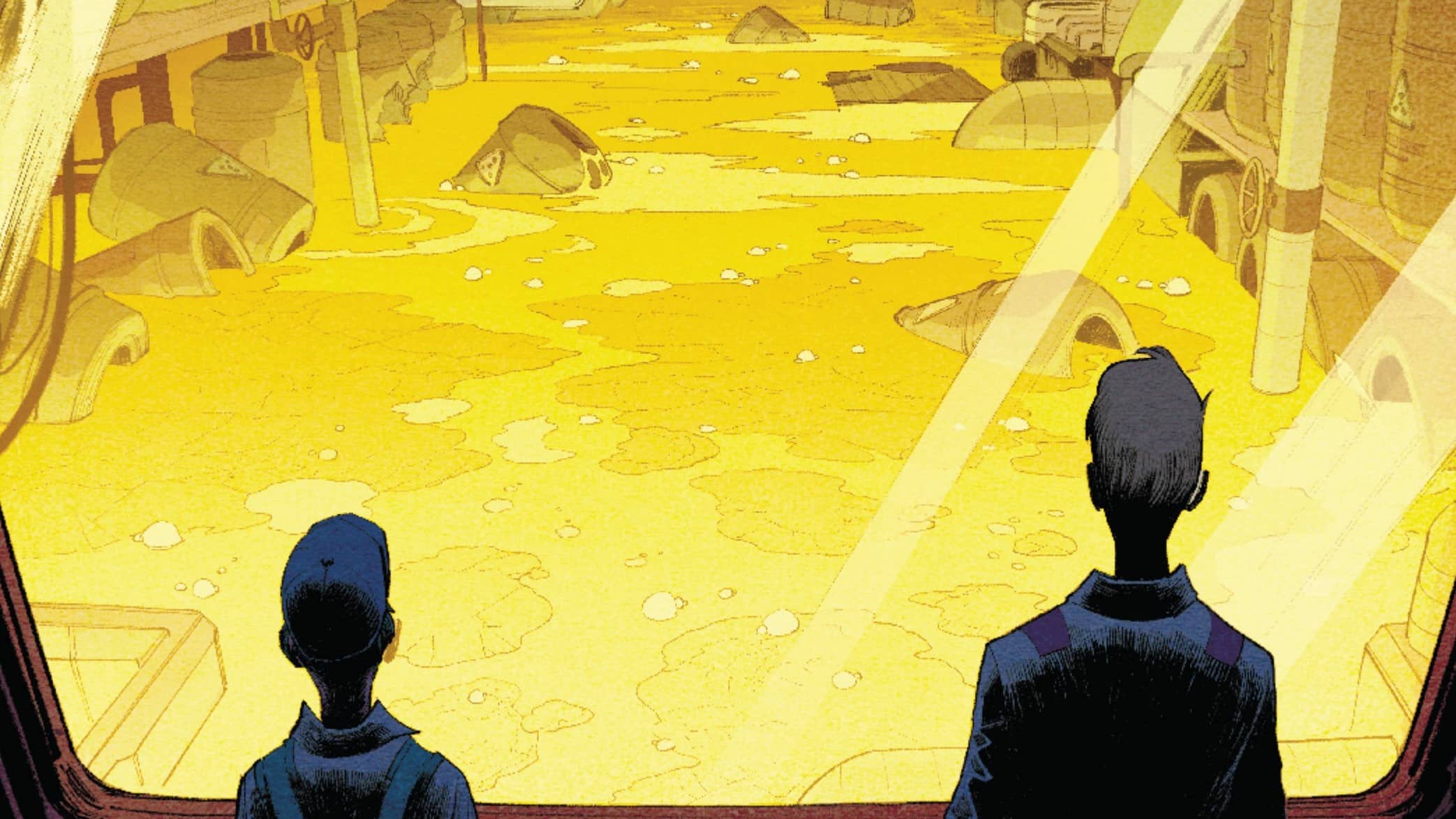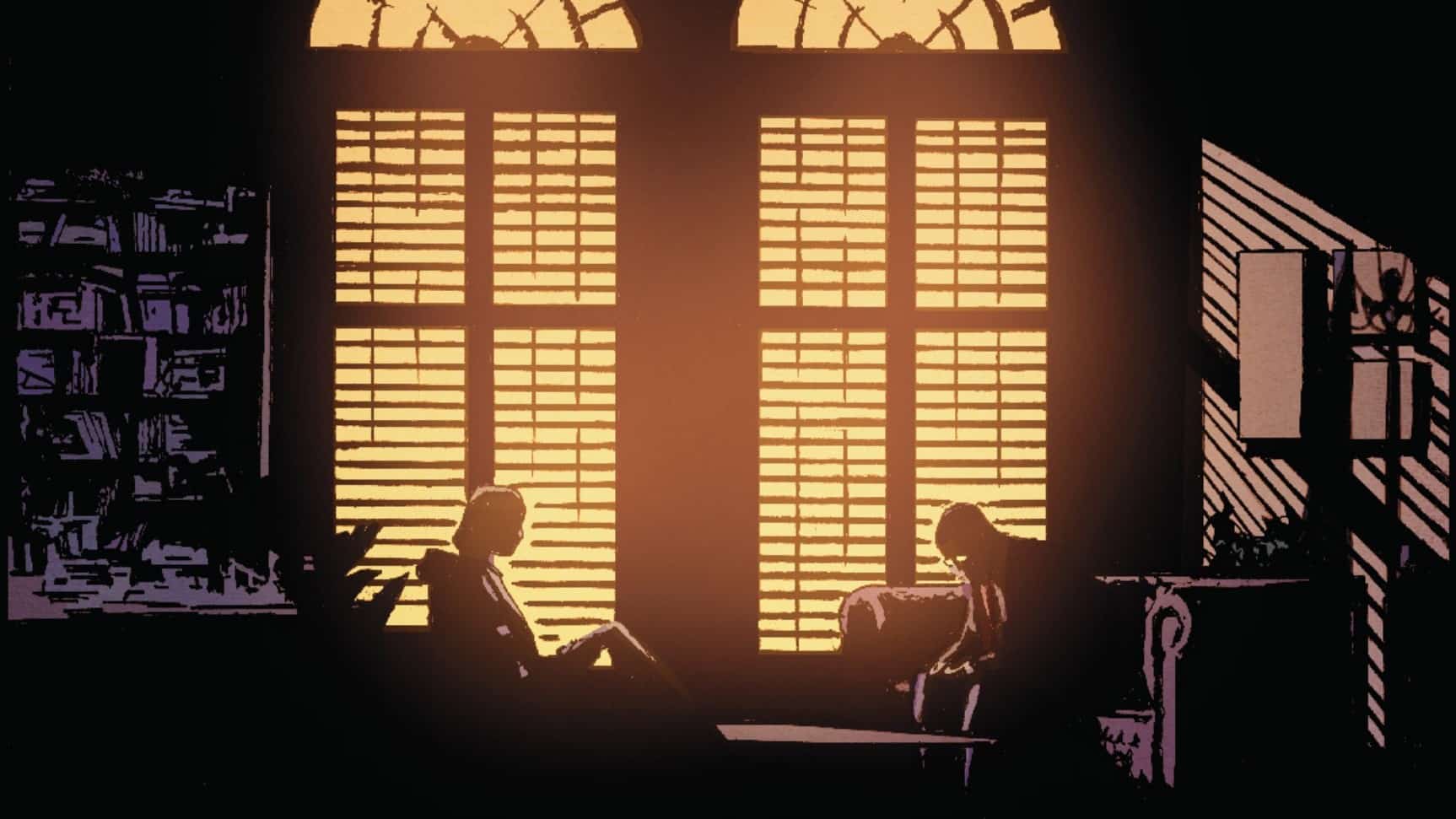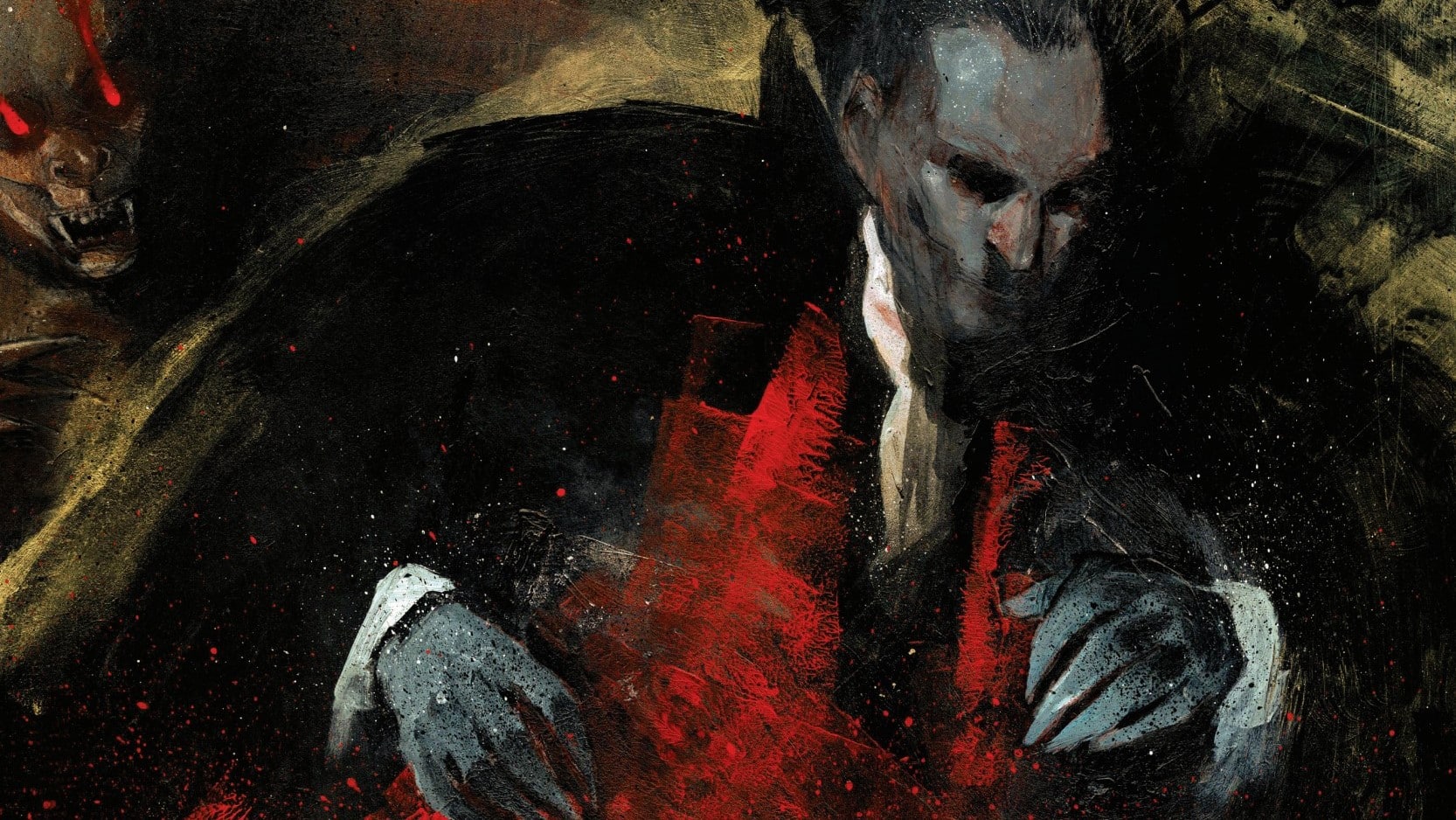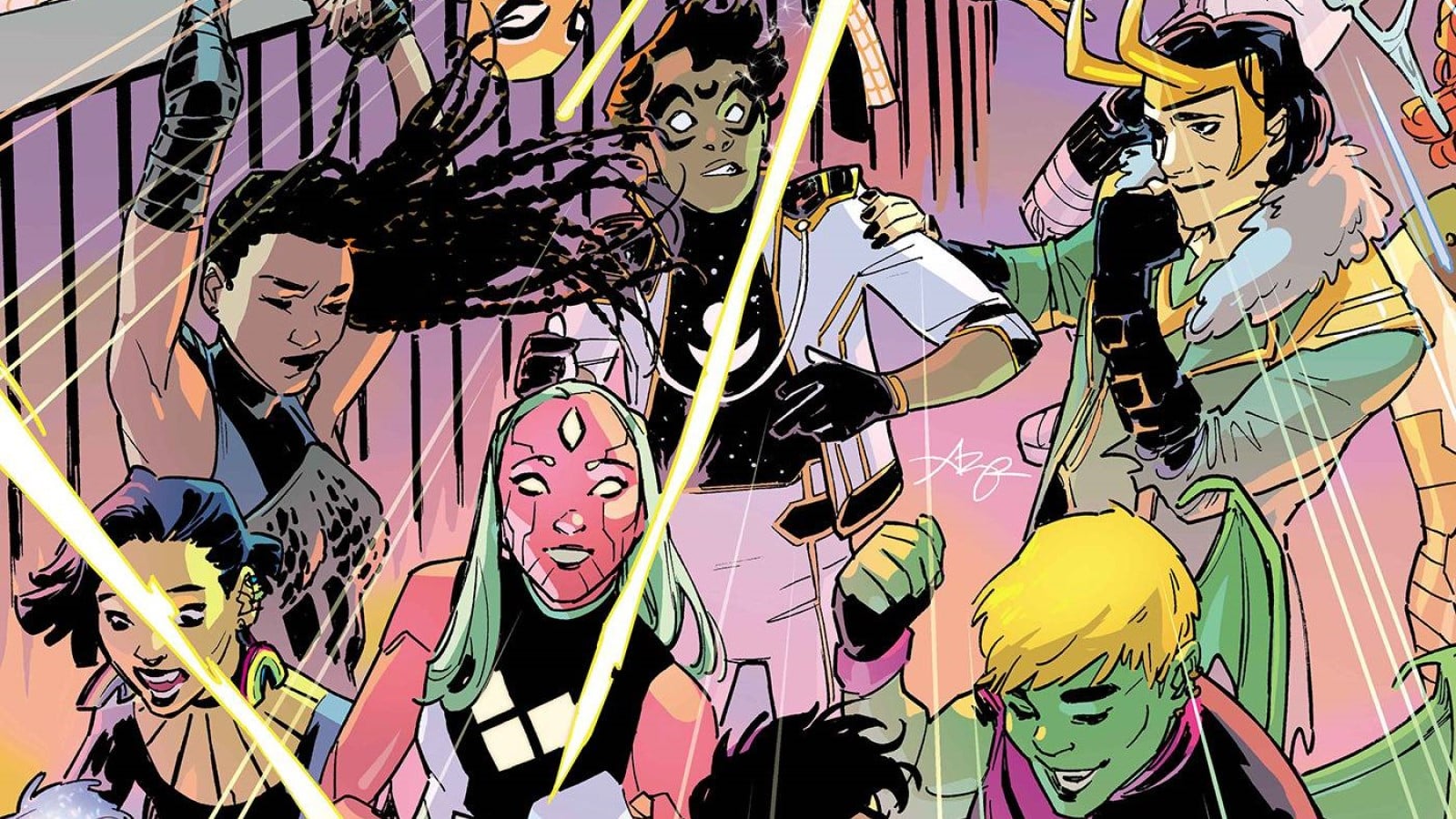You’re a clown at the end of your endless handkerchief, and the world is a depressing-assed place. What do you do? We look to Haha #1 for answers. Written by W. Maxwell Prince, drawn by Vanesa Del Rey, colored by Chris O’Halloran and lettered by Good Old Neon.
Will Nevin: Ari, what do you think about clowns?
Ari Bard: Well, Will, I generally think they’re a large dying profession of individuals that resort to a very narrow subset of humor in order to make people laugh but often come across as creepy or scary instead. I find them to be a bit unsettling myself, but I haven’t had very many experiences with one.
WN: And what about Ice Cream Man?
AB: I think it’s an amazing, loosely connected anthology that is able to achieve a new wavelength on the full spectrum of human emotion month after month, and it’s become one of my favorite comics ever.
WN: That’s a big ditto for me on Ice Cream Man, one of the most imaginative, creative things we’ve seen come along in comics. And — before we spend a bunch of words and time and maybe some good jokes on it — what do you think of this thing Haha that seemingly smashes together clowns and that book we like so much?
AB: Well, the only unconventional profession that I think might be even more unsettling than an ice cream man is a clown, so I’m expecting something that maybe has fewer supernatural elements and leans a bit more into uncanny imagery and the unified theme of clowns.
WN: The gift of laughter vs. (to borrow what Prince might write) a sticky sweet treat. Tough call. On with the book!
The Same, But Different

WN: I get the chance to interview Prince every now and then because I am a hot shit comics journalist, and I always ask him: Is Ice Cream Man about to end? Because the idea of that series going away makes me super cereal sad. Anyway, one of those times I broached the topic, he suggested he might wrap it up or take a pause or — and this is where we come to Haha — spend some time on different miniseries more or less within the ICM world. With O’Halloran on colors, Good Old Neon lettering and Prince hitting a bunch of the same themes we’ve seen, it seems like we’re set up for more creamy goodness — or are we? Do you see more daylight between this and ICM than I do?
AB: I do see a lot of similarities, Will, but I don’t think we’re really going to see the big picture of what Haha wants to or can be until we’re a few issues in. I know that other than a damn good short story, I couldn’t have told you what Ice Cream Man was going to be after reading just the first issue, and I’m not even sure that Prince himself knew. I think loosely connected series like Ice Cream Man and Haha are great formats for storytelling because there’s a feeling that everyone’s just going along for the ride that can’t be captured anywhere else, but there’s also limitless possibility for more stories. Only time will show us what’s in store and how similar these series really are.
WN: I think you’re right — we really do have to wait for more issues of Haha to see if its fundamental DNA is any different than what seems as of now to be its progenitor. We can at least address one big difference upfront in the rotating artist approach. Philosophically (abstractly?), does that add anything to the book for you?
AB: I think that it means that issues of Haha could be even less connected in some ways, but I think it also somehow expands the range of what we might see even further. ICM artist Martin Morazzo is incredibly talented and experimental, pulling off some elements of the craft that I didn’t even know was possible, so with a different artist at his disposal each issue, I’m curious what Prince will be able to accomplish and how he will play to their strengths.
WN: Speaking of art, what did you think about Del Rey’s work here? She is incredible when creating brooding, spooky landscapes like we see in Redlands. Here, however, the inks are too much, especially in real world interiors.
AB: For the most part, I actually really enjoy Del Rey’s work here. I do think that the inks can be a bit heavy sometimes, but she is able to paint a darker, grittier word that Bartleby has to resist in a way that some artists wouldn’t be able to do here. If anything, what I would have appreciated a bit more of is some coloring contrast when it comes to how O’Halloran colored Bartleby. I think there was a desire to visually portray Bartleby’s pushing back against reality by making his clown suit and other elements from his perspective stand out against gloomier, dirtier backgrounds, and I think O’Halloran could have taken it a bit further in some places. He almost gets there in the Looney Tunes-like panel on Page 17, but overall I think the colors are a bit too desaturated. I think if the stars, rainbows and his balloon family were a bit more vibrant and saturated, the contrast between reality and Bartleby’s head would’ve shown through even more effectively.
I Reject Your Reality and Substitute My Own

WN: We’ve got a clown (surprise), Bartleby, who’s having a rough go of things but ultimately rejects the idea that he has to be shitty because the world around him is shitty. What did you think of the overall story, and, because I know there has to be a reference here, did you read “Bartleby, the Scrivener”? I was always a “Benito Cereno” man myself.
AB: I read it after you asked me if I read it! I was completely unaware of “Bartleby, the Scrivener,” but I think the reference itself really informs a lot about the book for me. We see Bartleby’s passive resistance in Melville’s work and can interpret what Melville was trying to say about Wall Street, society and depression at the time, but there’s a new fascinating layer brought in when talking about the idea of rejecting reality itself. In truth, this is one of those stories I think I’ll be rereading for a while. I think this idea of living in this constant state of denial and almost ignorant happiness is something that’ll keep bouncing around in my brain. There’s something awfully dangerous yet slightly admirable about a man like Bartleby.
WN: For the readers who didn’t know already, now you know that Herman Melville wrote at least three things: Moby Dick, “Bartleby, the Scrivener” and “Benito Cereno.” Ari, I gotta say — I admire your dedication to the craft. I was not going to sit down and read “Bartleby,” and I’m probably still not going to, but I’ll at least look up the EN 101 notes on it, because I do think it’s an intentional reference — I mean, no one is naming a clown “Bartleby” by accident. The story (both Melville’s and Prince/Del Rey/O’Halloran’s) seems especially resonant now during a global pandemic and a failed insurrection against the U.S. government spurred on by a man who refuses to admit he lost a fair election and lives in a fantasy world crafted by any number of conspiracy theories (therein lies the scary part about Bartleby).
But the message of the comic — the message to me, anyhow — is one of the connective tissues to ICM: We can’t look to external sources for happiness and validation; those things have to come from yourself. That’s a message I think Prince has explored before when writing about social media, superheroes and a third thing I’m probably forgetting. What did this issue say to you?
AB: I think the message of hope in this issue lies with Prince and Del Rey’s ability to portray the power of internal resilience and happiness. I think those are both traits we all have within ourselves, and they’re incredibly powerful strengths that propel us to keep moving forward no matter what gets thrown in our way all the time.
But like you said, there’s a dangerous madness that can befall anyone who consistently denies external reality, because at some point, they start to have little regard for others as well. I think Bartleby is able to maintain a certain sparkle of hope because he still loves his wife and children even when he acknowledges their lack of respect for him. Things get dangerous when he starts to care less and less about others and when the idea of “I’d prefer not to,” a definite reference to Melville, extends to more than just a trio of bank robbers or his own pessimism.
Send in the Clowns

AB: A question that keeps popping into my head is: Why clowns? I understand their very uncanny nature, but I’m curious what purpose the clown occupation specifically serves this story and the series as a whole. If I were to guess, I would say that being a clown is a very unique occupation in that it’s completely removed from most aspects of reality. There are no goods and services traded or dealt with, and the craft of being a clown is often associated with providing a means to escape reality, to laugh and to forget one’s troubles. I guess what I’m asking is, what’s the deal with clowns?
WN: I don’t know the extent to which coulrophobia (that’d be the fancy word for “fear of clowns”) is an actual thing, but Prince himself said in a promotional release for the series that he doesn’t like them. I also think there’s a bit of an uncanny valley reaction to clowns — they don’t emote like humans, their appearances are distorted with paint and other accessories and yet they still come in human shapes and talk like us, so sometimes our brains don’t quite know what to make of them. And we naturally fear what we don’t understand. The interesting thing to me in Haha #1 is that the story really doesn’t depend on Bartleby being a clown as he’s framed as simply another guy stuck in a dead-end job, albeit one he’s passionate about.
AB: That’s true, although I think there is an inherent silliness to clowns that other dead-end jobs don’t have. I find that a lot of jobs in our society that we consider to be “dead-end jobs” are one our society couldn’t function without; unfortunately some of the most important jobs that are rooted in trade and public service are some of the least paid, least regarded and have very little mobility. I think any other job might put a little more emphasis on the position and why the lack of respect toward Bartleby from others is so undeserved, but one thing clowns do very well is grab your attention. Bartleby being a clown keeps a lot of the focus of the issue on him and his state of mind and less on the actions and attitudes of those around him. It’s almost as though these bad things are happening to him, not that other people are doing them to him.
WN: The ultimate (and terminal) unfairness of life — that’s an ICM message if there ever was one.
Here’s the Punchline
- There’s a really nice two-page spread where the ol’ “hide the credits in the art” trick turned out well.
- Clown trivia: In 1971, Jewish comedian Jerry Lewis starred in “The Day the Clown Cried,” the story of a fictional German clown who entertained children in Hilter’s concentration camps. The film, a disastrously misconceived idea, has never been screened for the public.

